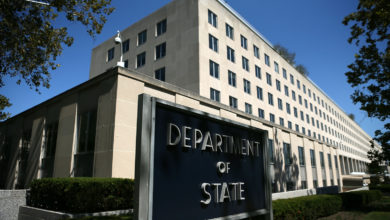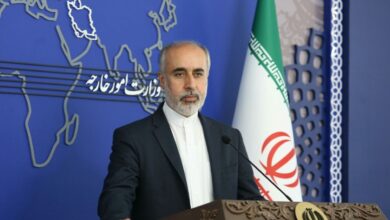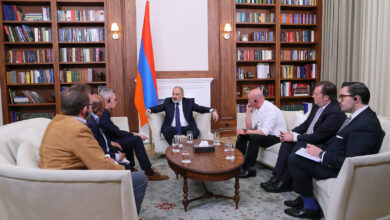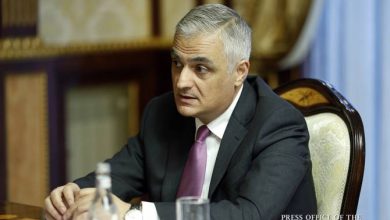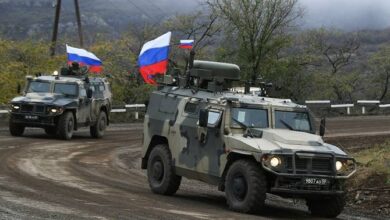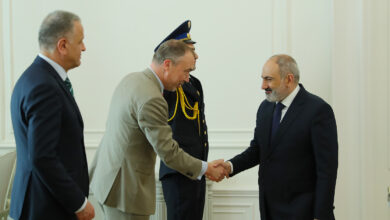Senators Menendez and Boxer ask Secretary of State designate Kerry questions on Armenian American Concerns
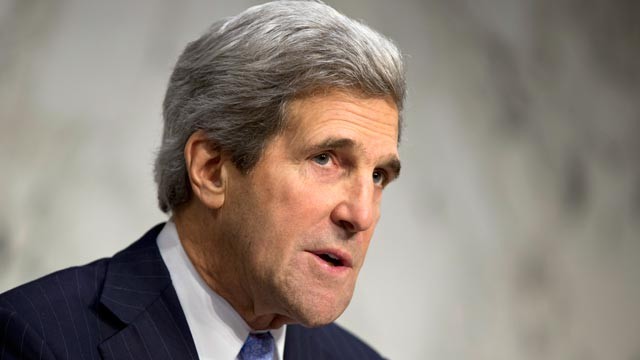
Senate Foreign Relations Committee members Robert Menendez (D-NJ) and Barbara Boxer (D-CA) questioned Secretary of State-designate John Kerry on a range of Armenian American concerns – from U.S. affirmation of the Armenian Genocide to our nation’s efforts to address ongoing Azerbaijani threats against Armenia and Nagorno Karabakh – during the confirmation process for President Obama’s nominee for this top diplomatic post, reported the Armenian National Committee of America (ANCA).
“We would like, first and foremost, to thank Senators Menendez and Boxer for raising Armenian issues with Secretary-designate Kerry during his confirmation hearing, and also to welcome Secretary Kerry to our nation’s top diplomatic posting,” said ANCA Executive Director Aram Hamparian.
“These responses by Senator Kerry, who, brings to this position a record of more than 30 years as a legislator as a champion of Armenian Genocide recognition, sadly reflect President Obama’s own public retreat, under pressure from Ankara, from his principled stand in support of a full and forthright American condemnation of Turkey’s still unpunished crime against all of humanity.”
Commenting on Senator Kerry’s reference to the failed Turkey-Armenia Protocols as a means of normalizing relations between the two countries, Hamparian stated, “The Obama Administration, by hiding behind the Turkey-Armenia Protocols in order to avoid angering Ankara by honestly condemning the Armenian Genocide, does a grave disservice to all past victims of genocide, and sends a dangerous message to all those who would, in the future, commit such crimes in the knowledge that with sufficient political leverage they can act with impunity and enforce a gag-rule upon the world’s condemnation of their actions.”
Hamparian noted the ongoing ANCA efforts to work with Obama Administration to advance a broad range of Armenian concerns. “We look forward, in the coming weeks and months, to working constructively with Secretary Kerry in support of a truthful and just policy on the Armenian Genocide, as well as efforts to ensure the right to self-determination of the people of Karabakh and a strong U.S.-Armenia relationship.”
Prior to the January 24th confirmation hearing, ANCA activists contacted Senators on the Foreign Relations Committee urging a them to seek clarity from Senator Kerry on a number of community issues.
Senator Kerry was approved by a vote of 94 to 3 to serve Secretary of State. He will begin serving in that capacity starting on Friday, February 1st.
Below are the complete written questions regarding Armenian American concerns submitted by Senators Menendez and Boxer, followed by Senator Kerry’s responses.
Questions for the Record Submitted to Secretary-Designate John Kerry by Senator Robert Menendez Committee on Foreign Relations
Question:
The U.S. State Department chronicled the effort to exterminate Armenians in the early 1900s — The Honorable Henry Morgenthau, U.S. Ambassador to Turkey from 1913-16 wrote in July 16, 1915, telegram to the Secretary of State, “Deportation of and excesses against peaceful Armenians is increasing and from harrowing reports of eye witnesses it appears that a campaign of race extermination is in progress under a pretext of reprisal against rebellion.” The U.S. Consul in Aleppo, Jesse Jackson, reported to Ambassador Morgenthau on June 5, 1915, “It is without doubt a carefully planned scheme to thoroughly extinguish the Armenian race.” The U.S. Consul in Harput, Leslie Davis reported to Ambassador Morgenthau on July 24, 1915, “It has been no secret that the plan was to destroy the Armenian race as a race, but the methods used have been more cold-blooded and barbarous, if not more effective, than I had at first supposed.” Ambassador Morgenthau was succeeded by the Honorable Abram I. Elkus, who served as Ambassador from 1916-17. On October 17, 1916, Elkus telegrammed the Secretary of State about the extreme measures sanctioned by the Turks, stating “In order to avoid opprobrium of the civilized world, which the continuation of massacres [of the Armenians] would arouse, Turkish officials have now adopted and are executing the unchecked policy of extermination through starvation, exhaustion, and brutality of treatment hardly surpassed even in Turkish history.” How does the Department refer to the events that occurred during this time period?
Answer:
The U.S. government clearly acknowledges and mourns as historical fact that 1.5 million Armenians were massacred or marched to their deaths in the final days of the Ottoman Empire. These events resulted in one of the worst atrocities of the 20th century, and the United States recognizes that they remain a great source of pain for the people of Armenia and of Armenian descent as they do for all of us who share basic universal values. The President honors the victims every April 24th on Remembrance Day, so that we never forget this dark chapter in history.
Question:
The State Department has concluded, wrongly I think, to not recognize the Armenian genocide despite a replete historical record. I think it is a grave mistake to not recognize atrocities, historical facts for political reasons however compelling – I think it sends the wrong message to perpetrators and obfuscates the “never again” policy. As a member of the Senate you supported legislation recognizing the Armenian genocide and the deaths of 1.5 million Armenians who were brutally massacred or marched to their deaths in the waning days of the Ottoman Empire.
Will you share your views and record on this matter with members of the Department and the Administration?
Answer:
If confirmed as Secretary of State, my duty would be to represent the policies of the President and Administration faithfully. As the President has emphasized in his April 24th Remembrance Day statements, the achievement of a full, frank, and just acknowledgement of the facts of what occurred in 1915 is in all our interests. He also has said that the best way to advance that goal is for the Armenian and Turkish people to address the facts of the past as a part of their efforts to move forward. The United States is encouraging Turkey at the highest levels to engage productively with Armenia on the normalization protocols, to open the border, to reinstitute transportation, communication, and utility links between the two countries, and to re-establish diplomatic relations. If confirmed, I will continue to strongly support all efforts to normalize bilateral relations between Armenia and Turkey so that together, they can forge a relationship that is peaceful, productive, and prosperous.
Question:
As a matter of policy, the United States has been a strong proponent for the normalization of relations between Armenia and Turkey, and as such actively supported the Protocols between Armenia and Turkey, which were signed in October of 2009. The Protocols between Armenia and Turkey provided a road map to normalization of relations. However, despite its public commitments, Turkey not only failed to ratify them, but also sought to add conditions not in the Protocols, such as resolving the Nagorno-Karabakh issue. This coupled with Azerbaijan’s counterproductive actions effectively derailed the process. Instead of lifting its blockade, Turkey, in coordination with Azerbaijan, continues to maintain its nearly 20-year long blockade against Armenia. Secretary Clinton has praised Armenia for its approach vis-à-vis normalization and has repeatedly stated that the ball is now in Turkey’s court. Lifting of the blockade is not only the right thing to do; it is also long overdue. Please outline the steps you will take to end Turkey’s blockade of Armenia and ensure that Turkey lives up to its international commitments with respect to the Armenia-Turkey Protocols.
Answer:
The United States believes that full normalization of relations between Turkey and Armenia is important not only for the future of both countries, but for long-term stability and security in the Caucasus. Normalization between Turkey and Armenia remains a prominent feature of our dialogue with both countries. Secretary Clinton and other senior officials consistently raise the protocols with Turkish leaders at the highest levels, and if confirmed as Secretary, I will ensure that the State Department continues to do so.
Questions for the Record Submitted to Secretary-Designate John Kerry by Senator Barbara Boxer Committee on Foreign Relations
Question:
If confirmed, what steps can the U.S. take to put pressure on President Aliyev to reconsider his decision and return Mr. Safarov to jail?
Answer:
Immediately after learning of Azerbaijani President Aliyev’s pardon of Ramil Safarov, the United States raised its concerns directly with the highest levels of the government of Azerbaijan. In addition, both the White House and the State Department released strong statements of concern over Mr. Safarov’s transfer and subsequent pardon. Mr. Safarov was tried and convicted of a brutal murder, and the United States was extremely troubled to learn that he would not serve the remainder of his sentence.
As a co-chair of the OSCE Minsk Group, the United States continues working to help the sides reach a peaceful resolution to the Nagorno-Karabakh conflict, and the United States condemns any action that fuels tension in the region or threatens to damage the peace process. If confirmed, I will continue to raise the concerns expressed by the United States previously and do everything I can to help the parties resolve the Nagorno-Karabakh conflict peacefully.
Question:
Azerbaijan has threatened to shoot down aircraft that fly into the newly rebuilt airport in Nagorno-Karabakh.
How will you respond, publicly and privately, to this threat and to any other new acts of aggression from Azerbaijan?
Answer:
The United States believes that the parties to this dispute must resolve this dangerous situation diplomatically; the Administration has firmly opposed any steps by any party that increase tensions in the region or threaten to damage the peace process in the Nagorno-Karabakh conflict. As a Co-Chair of the OSCE Minsk Group, along with Russia and France, the United States responded swiftly when such threats first appeared, and the Administration has continued to raise the issue bilaterally and through the Minsk Group Co-Chairs. If confirmed as Secretary of State, I will continue working to support the peace process and to oppose actions that could increase tensions in the region or damage the peace process.
Question:
If confirmed, will you or a member of your staff commit to meet with the Armenian American community and religious leaders from a broad cross-section of the community?
Answer:
Department officials maintain an ongoing dialogue regarding our foreign policy with a broad cross-section of the American people, including members of the Armenian-American community and leaders in the religious community. This mutual exchange of information and ideas is an important element in the work of the State Department, and if confirmed as Secretary, I will ensure that it continues.
Question:
If confirmed, will you be an advocate within the Obama Administration for recognition of the Armenian genocide?
Answer:
If confirmed as Secretary of State, my duty would be to represent the policies of the President and Administration faithfully. As the President has emphasized in his April 24 Remembrance Day statements, the achievement of a full, frank, and just acknowledgement of the facts of what occurred in 1915 is in all our interests. He also has said that the best way to advance that goal is for the Armenian and Turkish people to address the facts of the past as a part of their efforts to move forward. The United States is encouraging Turkey at the highest levels to engage productively with Armenia on the normalization protocols, to open the border, to reinstitute transportation, communication, and utility links between the two countries, and to re-establish diplomatic relations. If confirmed, I will continue to strongly support all efforts to normalize bilateral relations between Armenia and Turkey so that together, they can forge a relationship that is peaceful, productive, and prosperous.



